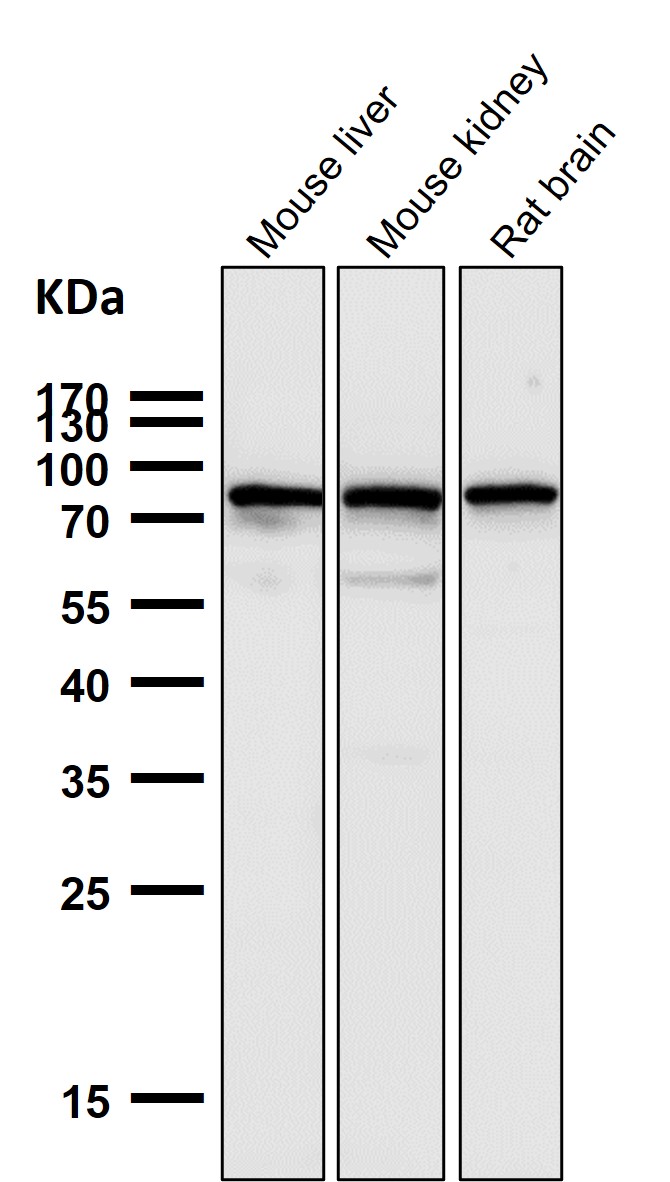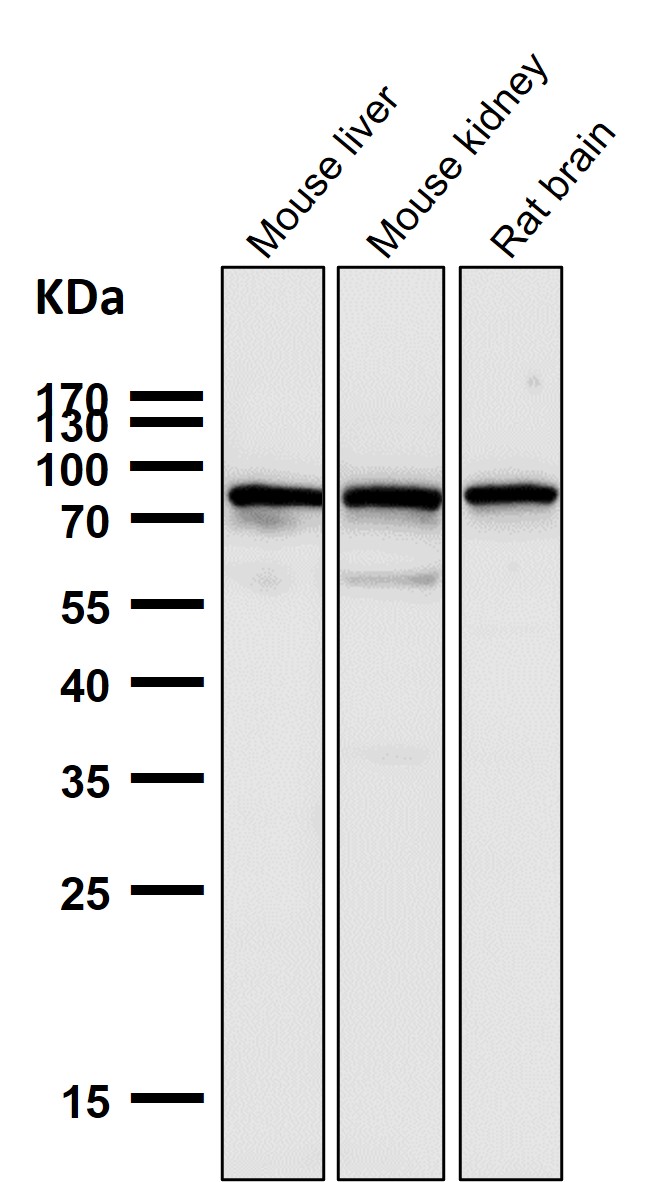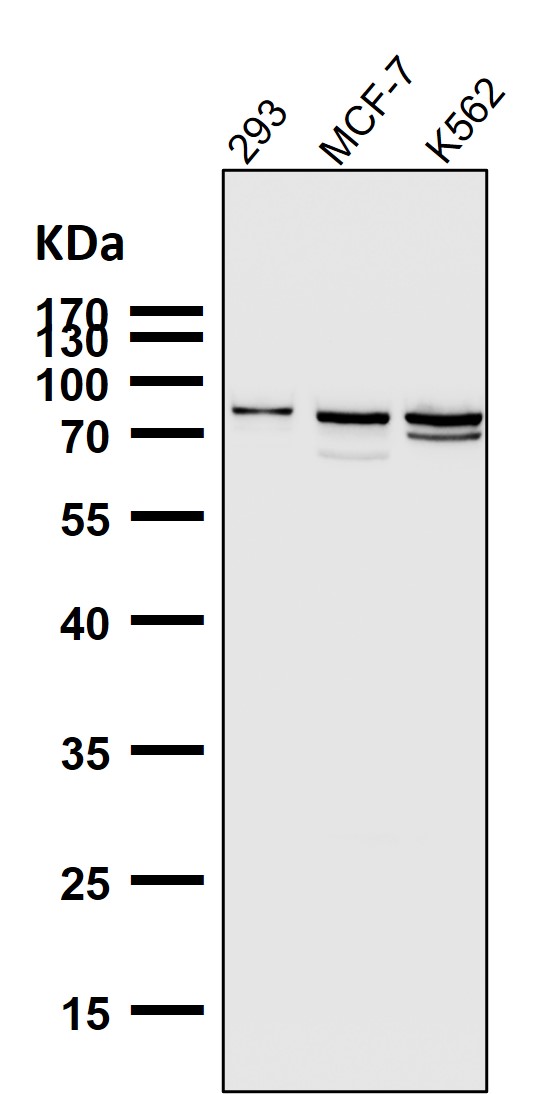


| WB | 1/1000-1/2000 | Human,Mouse,Rat |
| IF | 咨询技术 | Human,Mouse,Rat |
| IHC | IHC:1/100-1/200;IHF:1/50-1/200 | Human,Mouse,Rat |
| ICC | 1/50-1/200 | Human,Mouse,Rat |
| FCM | 1/20-1/100 | Human,Mouse,Rat |
| Elisa | 咨询技术 | Human,Mouse,Rat |
| Aliases | FRIGG; UNC84B;;SUN2 |
| WB Predicted band size | 80 kDa |
| Host/Isotype | Rabbit IgG |
| Antibody Type | Primary antibody |
| Storage | Store at 4°C short term. Aliquot and store at -20°C long term. Avoid freeze/thaw cycles. |
| Species Reactivity | Human,Mouse,Rat |
| Immunogen | A synthesized peptide derived from human SUN2 |
| Formulation | Purified antibody in PBS with 0.05% sodium azide,0.05% BSA and 50% glycerol. |
+ +
以下是关于SUN2抗体的3篇参考文献的简要总结:
1. **文献名称**:*SUN2 regulates mitotic duration in response to extracellular matrix rigidity*
**作者**:Lei K, et al.
**摘要**:该研究利用SUN2特异性抗体,通过免疫荧光和Western blot技术,发现SUN2通过调控核膜与细胞骨架的相互作用,影响细胞对基质硬度的感知,从而调节有丝分裂时长。
2. **文献名称**:*Nuclear envelope-localized SUN2 modulates HIV-1 infection*
**作者**:Berger G, et al.
**摘要**:研究通过SUN2抗体进行免疫共沉淀实验,揭示SUN2在核膜上与HIV-1病毒整合复合体互作,抑制病毒DNA进入细胞核的过程,为抗病毒机制提供了新视角。
3. **文献名称**:*SUN2 antibody validation in neuronal nuclear architecture analysis*
**作者**:Kim D, et al.
**摘要**:该文献系统验证了SUN2抗体的特异性,通过siRNA敲除实验和免疫电镜证实其识别核膜定位的SUN2蛋白,并应用于神经元核形态研究中,证明SUN2缺陷导致核结构异常。
(注:以上文献信息为模拟概括,实际引用时请核实原文准确性。)
The SUN2 antibody is a crucial tool in studying the SUN domain-containing protein 2 (SUN2), a component of the linker of nucleoskeleton and cytoskeleton (LINC) complex. SUN2. encoded by the *SUN2* gene, is a transmembrane protein localized to the inner nuclear membrane. It plays a pivotal role in maintaining nuclear architecture, mediating mechanical connections between the nuclear lamina and the cytoskeleton via interactions with nesprins. SUN2 also participates in processes such as nuclear positioning, cell migration, and mechanotransduction.
The SUN2 antibody is widely used in research to detect and quantify SUN2 expression in various cell types and tissues through techniques like Western blotting, immunofluorescence, and immunohistochemistry. It helps investigate SUN2's involvement in cellular responses to mechanical stress, DNA repair, and cell cycle regulation. Dysregulation of SUN2 has been linked to pathologies including cancer, muscular dystrophies, and cardiovascular diseases, making its antibody valuable for exploring disease mechanisms. Available as monoclonal or polyclonal variants, SUN2 antibodies are typically raised in hosts like rabbits or mice, targeting specific epitopes (e.g., C-terminal domains). Validation includes knockout controls or siRNA knockdown to ensure specificity, supporting studies in cell biology, developmental biology, and pathophysiology.
×